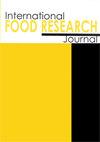Evaluation of transgalactosylation activity of commercial β-galactosidase from Bifidobacterium bifidum for synthesis of prebiotic oligosaccharides
IF 1
4区 农林科学
Q4 FOOD SCIENCE & TECHNOLOGY
引用次数: 0
Abstract
Galacto-oligosaccharides (GOS) are products of transgalactosylation reaction of β-galactosidase when lactose is used as the substrate. These carbohydrates are considered prebiotics which stimulate beneficial effects to human health. In the present work, Saphera, a commercial preparation of β-galactosidase from Bifidobacterium bifidum, was biochemically characterised for production of GOS. Using o-nitrophenyl-β-D-galactopyranoside (oNPG) as the substrate, optimal activity for the enzyme was found to be at pH 6.0 and at 45°C. Ten (10) mM each of either Na+ or K+ enhanced enzyme activity by 10%, while Cu2+, Zn2+, Fe2+, and EDTA showed inhibitory effect on the enzyme activity. When incubated in 50 mM sodium phosphate and pH 6.5, the enzyme was found to have half-life time of 136 ± 6 and 2.1 ± 0.2 h at 30 and 50°C, respectively. The hydrolysis activity of the enzyme predominated when the initial lactose concentration used was 5% (w/v). When initial lactose concentration was increased to 20% (w/v), maximum GOS yield obtained was 10% (w/w) achieved at 86% lactose conversion. Analysis using high performance anion exchange chromatography with pulsed amperometric detection (HPAEC-PAD) revealed that the major oligosaccharides produced by the enzyme were 3’-galactosylglucose, 3’-galactosyllactose, 3’-galactobiose, and allolactose, thus showing that this enzyme would prefer to form β-(13)- and β-(16)-linked GOS. Despite its predominantly hydrolytic activity, Saphera synthesised prebiotic GOS which could be interesting to dairy industry.评估双歧杆菌商用 β-半乳糖苷酶在合成益生寡糖中的转半乳糖基化活性
半乳糖寡糖(GOS)是β-半乳糖苷酶以乳糖为底物进行转半乳糖基化反应的产物。这些碳水化合物被认为是益生元,对人体健康有益。在本研究中,对 Saphera(一种从双歧杆菌中提取的β-半乳糖苷酶的商业制剂)进行了生化鉴定,以确定其生产 GOS 的特性。以邻硝基苯基-β-D-吡喃半乳糖苷(oNPG)为底物,发现该酶的最佳活性是在 pH 值为 6.0 和温度为 45°C 时。10 mM Na+ 或 K+ 可使酶活性提高 10%,而 Cu2+、Zn2+、Fe2+ 和 EDTA 对酶活性有抑制作用。在 50 mM 磷酸钠和 pH 值为 6.5 的条件下培养时,发现该酶在 30 和 50°C 下的半衰期分别为 136 ± 6 和 2.1 ± 0.2 h。当初始乳糖浓度为 5%(w/v)时,酶的水解活性占主导地位。当初始乳糖浓度增加到 20%(w/v)时,在乳糖转化率达到 86%的情况下,获得的最大 GOS 产量为 10%(w/w)。使用脉冲安培检测(HPAEC-PAD)的高效阴离子交换色谱法进行的分析表明,该酶产生的主要低聚糖是 3'- 半乳糖基葡萄糖、3'-半乳糖基全乳糖、3'-半乳糖基生物糖和全乳糖,从而表明该酶更倾向于形成 β-(13)- 和 β-(16)- 连接的 GOS。尽管 Saphera 主要具有水解活性,但它合成的益生菌 GOS 对乳制品行业很有意义。
本文章由计算机程序翻译,如有差异,请以英文原文为准。
求助全文
约1分钟内获得全文
求助全文
来源期刊

international food research journal
Agricultural and Biological Sciences-Food Science
CiteScore
1.40
自引率
0.00%
发文量
75
期刊介绍:
The International Food Research Journal (IFRJ) publishes papers in English, six (6) issues a year with the coverage of:
Food Science and Technology
Nutrition and Dietetics
Agriculture, multidisciplinary
Chemistry, multidisciplinary
The scope of the Journal includes:
Food Science, Food Technology and Food Biotechnology
Product Development and Sensory Evaluation
Food Habits, Nutrition, and Health
Food Safety and Quality
Food Chemistry, Food Microbiology, Food Analysis and Testing
Food Engineering
Food Packaging
Food Waste Management
Food Entrepreneur
Food Regulatory
Post-Harvest Food Management
Food Supply Chain Management
Halal Food and Management
 求助内容:
求助内容: 应助结果提醒方式:
应助结果提醒方式:


